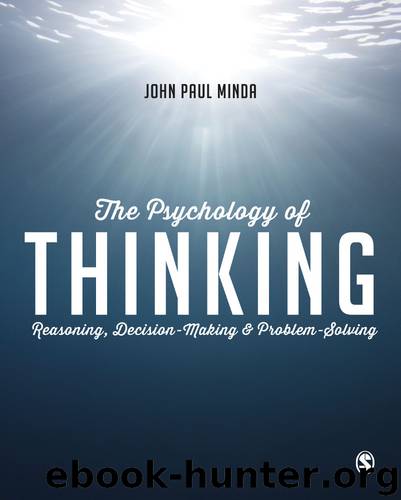The Psychology of Thinking: Reasoning, Decision-Making and Problem-Solving by John Paul Minda

Author:John Paul Minda [Minda, John Paul]
Language: eng
Format: azw3
Publisher: SAGE Publications
Published: 2015-09-11T04:00:00+00:00
Syllogism: Mrs Cooke had studied home economics in college. “Youth is a time of rapid growth and great demands on energy,” she said. “Many youngsters don’t get enough vitamins in their daily diet. And since some vitamin deficiencies are dangerous to health, it follows that the health of many of our youngsters is being endangered by inadequate diet.”
Subjects were asked to indicate if they thought that it was a valid conclusion to say that the “health of many youngsters is being endangered by inadequate diet”. Many subjects extended the first premise to be universal by ignoring the word “many” and restating it as “Youngsters do not get enough vitamins”. In doing so they endorsed this conclusion.
In short, Henle (1962) noted that people seem not to accept logical tasks as being deducto-logical. They misstate premises, omit premises, and generally fall prey to the kinds of cognitive biases that Kahneman and Tversky would later describe with respect to judgement, inductive reasoning, and decision-making (Kahneman & Tversky, 1973; Tversky & Kahneman, 1973, 1974). It is important to note that these results do not indicate that subjects were unable to reason logically, but only that they did not treat this as a logical task, even when directed to. Henle (1962) suggested that the problem was that people focused on the semantics and the content rather than on the form of the argument itself. And later work confirmed many of these biases and shortcomings. Johnson-Laird suggests that naïve reasoners with no training in formal thought may make many cognitive errors in reasoning and yet still manage to achieve their goals and make good decisions (Johnson-Laird, 1999). He refers to this as a fundamental paradox of rationality. This is a paradox because rationality should be a necessary condition for correct decision-making and should be a hallmark of formal, mature thinking, and yet in many ways it does not seem to be necessary at all.
Deductive logic is challenging for most people. The fact that we fail can be attributed to both the complexity and abstractness of the tasks (Johnson-Laird, 1999) as well as the general effectiveness of many cognitive heuristics (Anderson, 1990; Gigerenzer et al., 2011; Sloman, 1996). It may be that for many basic decisions and conclusions, logical deduction is not needed and the additional resources needed to reason correctly may be suboptimal.
Download
This site does not store any files on its server. We only index and link to content provided by other sites. Please contact the content providers to delete copyright contents if any and email us, we'll remove relevant links or contents immediately.
| Administration & Medicine Economics | Allied Health Professions |
| Basic Sciences | Dentistry |
| History | Medical Informatics |
| Medicine | Nursing |
| Pharmacology | Psychology |
| Research | Veterinary Medicine |
The Art of Thinking Clearly by Rolf Dobelli(10401)
The 5 Love Languages: The Secret to Love That Lasts by Gary Chapman(9767)
Mindhunter: Inside the FBI's Elite Serial Crime Unit by John E. Douglas & Mark Olshaker(9305)
Becoming Supernatural by Dr. Joe Dispenza(8191)
Nudge - Improving Decisions about Health, Wealth, and Happiness by Thaler Sunstein(7684)
The Road Less Traveled by M. Scott Peck(7579)
Mastermind: How to Think Like Sherlock Holmes by Maria Konnikova(7310)
Enlightenment Now: The Case for Reason, Science, Humanism, and Progress by Steven Pinker(7300)
Win Bigly by Scott Adams(7178)
The Way of Zen by Alan W. Watts(6587)
Factfulness: Ten Reasons We're Wrong About the World – and Why Things Are Better Than You Think by Hans Rosling(4727)
The State of Affairs by Esther Perel(4707)
Gerald's Game by Stephen King(4630)
Man's Search for Meaning by Viktor Frankl(4561)
The Confidence Code by Katty Kay(4241)
Thinking in Bets by Annie Duke(4210)
The Healing Self by Deepak Chopra(3563)
Hidden Persuasion: 33 psychological influence techniques in advertising by Marc Andrews & Matthijs van Leeuwen & Rick van Baaren(3538)
The Worm at the Core by Sheldon Solomon(3474)
